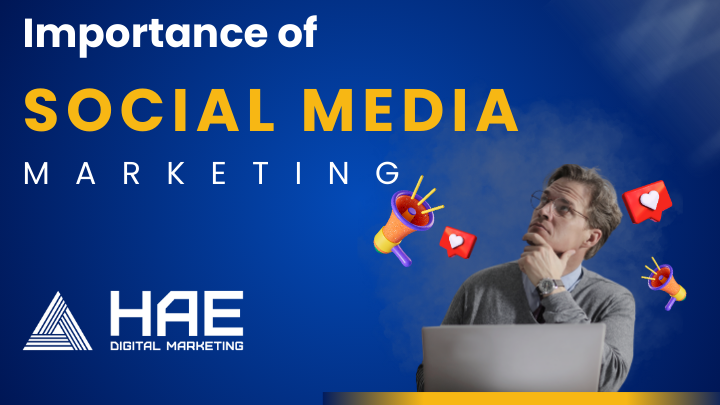Importance of Social Media Marketing
Introduction
In today’s hyper-connected digital world, social media marketing has become one of the most powerful tools available to businesses — big or small. With billions of active users on platforms like Facebook, Instagram, and LinkedIn, social media offers an unmatched opportunity to build brand awareness, connect with your audience, and drive real business growth. This blog explores why social media marketing is essential in today’s business landscape and how to use it effectively.
What is Social Media Marketing?
Social media marketing involves creating and sharing content across various platforms to achieve branding and business goals. This includes posting images and videos, sharing updates, engaging with followers in real-time, and running targeted paid campaigns. Whether you’re aiming to build brand awareness or increase sales, social media offers a dynamic space to attract attention, generate leads, and foster customer relationships.
Why Social Media Marketing is Essential for Businesses Today
In the current business climate, having a strong social media presence is no longer optional — it’s essential. It allows businesses to reach a global audience quickly and affordably, engage directly with customers in real time, and gather valuable insights into consumer behavior. Social media also humanizes your brand, giving it a relatable voice and personality. Whether you’re a small startup or a multinational enterprise, strategic use of social media can significantly drive growth and customer loyalty.
Top Benefits of Social Media Marketing
Social media marketing provides a wide range of benefits. First, it significantly increases brand awareness by regularly putting your content in front of potential customers. It encourages higher engagement through likes, shares, comments, and messages, which in turn strengthens your connection with your audience. It’s also highly cost-effective, offering both free and paid options to fit every budget. Additionally, the built-in analytics tools help you understand your audience better, allowing you to tailor content to their interests. Engaging, authentic content also fosters trust and builds long-term loyalty.
How Social Media Boosts Brand Visibility and Engagement
Social platforms allow your brand to show up where your audience spends most of their time. By maintaining consistent branding, telling authentic stories, and posting interactive content like polls or live sessions, you naturally enhance your visibility. These platforms offer a two-way communication channel, which not only boosts engagement but also creates emotional connections that strengthen brand loyalty.
Social Media vs. Traditional Marketing
Compared to traditional marketing, social media marketing is more budget-friendly and efficient. While traditional marketing often comes with high costs and limited targeting, social media allows you to reach highly specific audiences at a lower price. The engagement is two-way — encouraging conversations rather than just pushing messages — and performance is easily measurable using real-time analytics. Social media campaigns can also be launched and adjusted instantly, unlike traditional methods which typically require longer setup times.
Key Social Media Platforms and Their Unique Strengths
Each platform brings something different to the table. Facebook is ideal for building communities and running targeted ad campaigns. Instagram is excellent for visual storytelling, lifestyle branding, and influencer marketing. Twitter (now X) is great for sharing real-time updates, news, and trending content. LinkedIn excels in professional networking, B2B engagement, and sharing thought leadership content. Choosing the right mix of platforms depends on your audience and goals.
Important Metrics to Track Social Media Success
To measure your social media performance, focus on a few essential metrics. Engagement rate — reflected through likes, shares, and comments — shows how well your audience is interacting with your content. Reach tells you how many unique users are seeing your posts, while conversion rate indicates the number of users who are taking desired actions, like making a purchase or signing up for a newsletter. Click-through rate reveals how relevant your content is, and tracking follower growth helps you understand whether your audience base is expanding over time.
Integrating Social Media Into Your Overall Marketing Strategy
Social media should work hand-in-hand with your broader digital marketing efforts. It complements SEO by sharing blog posts and improving content visibility. It supports email marketing by driving subscriptions and engagement. It also enhances the performance of paid ads by nurturing leads and increasing brand touchpoints. An integrated strategy helps amplify your digital presence, drive traffic, and improve overall ROI.
Common Challenges and How to Overcome Them
Like any marketing channel, social media comes with its own set of challenges. Low engagement can be tackled by creating interactive content such as polls, quizzes, or live videos. Negative feedback should be addressed quickly and professionally to build transparency and trust. Content fatigue can be avoided by planning in advance using content calendars and repurposing high-performing posts. To stay ahead of platform algorithm changes, it’s important to remain flexible and continuously adjust your strategy.
Emerging Trends in Social Media Marketing
Looking ahead, short-form videos like Reels will continue to dominate user attention. AI-generated content and automation tools such as chatbots are also on the rise, helping brands save time and personalize experiences. Community-focused platforms and private groups are becoming more important as people seek deeper, more meaningful connections. Additionally, consumers are placing higher value on authenticity and ethical marketing practices, making transparency a key factor in long-term brand success.
Conclusion
Social media marketing is a vital component of modern digital strategy. When done right, it boosts brand visibility, deepens audience engagement, and generates real business results. By understanding the platform landscape, tracking performance, and staying ahead of trends, businesses can build stronger relationships with their audiences and thrive in an ever-changing digital world.
Follow us on Instagram for more insights, tips, and digital marketing strategies!

Comments
Post a Comment